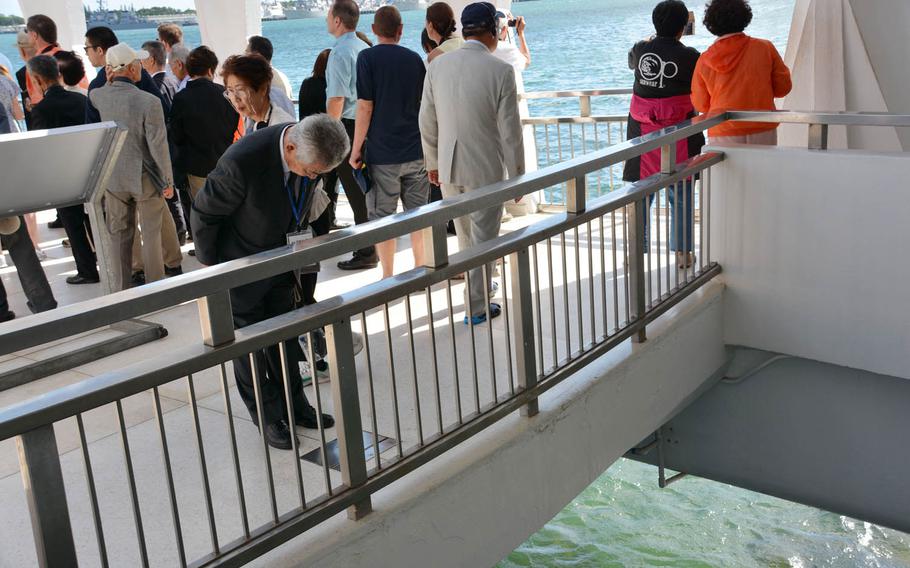
Yukio Udagawa, vice president of the Japan War-Bereaved Families Association, bows in prayer on Thursday, Sept. 21, 2017, over a portal at the USS Arizona Memorial for viewing "black tears," oil seeping from the ship that has been submerged since being sunk 75 years ago during the surprise attack on Pearl Harbor. (Wyatt Olson/Stars and Stripes)
USS ARIZONA MEMORIAL, Hawaii – In a brief, silent ceremony Thursday, 32 Japanese men and women successively stepped forward, bowed and laid a single white flower in the shrine room that holds the names of the hundreds of U.S. sailors and Marines who died on the USS Arizona 75 years ago.
It was a particularly poignant act for the group, who, as members of the Japan War-Bereaved Families Association, lost close family members during World War II that for America began with the Japanese surprise attack on Pearl Harbor on Dec. 7, 1941.
“I think this is very significant,” said Byrnes K. Yamashita, a 65-year-old Hawaiian native whose father served with the U.S. Army’s famed 442nd Regimental Combat Team, composed of soldiers of Japanese descent. He spent the day with the group as they toured Pearl Harbor.
“As you can see, many of these folks are advanced in age,” he said. “They were young children at the end of the war. Almost all of them lost fathers. I think this is kind of a closure experience for them to kind of leave that behind.”
The group was scheduled on Friday to visit the National Memorial Cemetery of the Pacific in Honolulu, which is the final resting place for hundreds of American war dead and veterans of World War II. They then fly to Washington, D.C., where they will offer prayers, flowers and 1,000 paper cranes to American servicemembers buried at Arlington National Cemetery.
During a short talk to the group, Yamashita said, “Together, we will always remember the people that died in the war, but for the future we want to be friends with Japan.”
Yukio Udagawa, vice president of the association, said through a translator that his father, a soldier, was killed in Papua New Guinea in 1943.
“I was 3 years old, so I don’t even remember him,” he said. But the absence of a father taken by war remains a grief and a resentment even in the decades after the close of that conflict.
“Bringing an end to the war might differ from person to person,” he said. “For us, this is a dedication to say that war has ended, and we still remember those who have died as we move into the future.”
This year marks the 70th anniversary of the founding of the Japan War-Bereaved Families Association, Udagawa said, and the milestone was a primary reason for visiting America to pay respects to the its war dead.
But the visit would likely not have happened had not President Barack Obama and Japan Prime Minister Shinzo Abe met at Pearl Harbor in December, where they stood side by side in the same USS Arizona Memorial shrine room. In May 2016, Obama became the first sitting president to visit Hiroshima, where America dropped an atomic bomb that hastened the end of World War II.
“It is here we remember that even when hatred burns the hottest, even when the tug of tribalism is the most primal, we must resist the urge to turn inward; we must resist the urge to demonize those who are different,” Obama said during the visit to Pearl Harbor.
“They basically said, time to bury the hatchet,” said Yamashita, who attended the ceremony of the two leaders at Pearl Harbor. “We will remember the past; we’re not forgetting it. But we’re looking ahead to the future, one of peace between our two countries.
“I think that opens the door for groups like this to come and pay their respects.”
olson.wyatt@stripes.com Twitter: @WyattWOlson